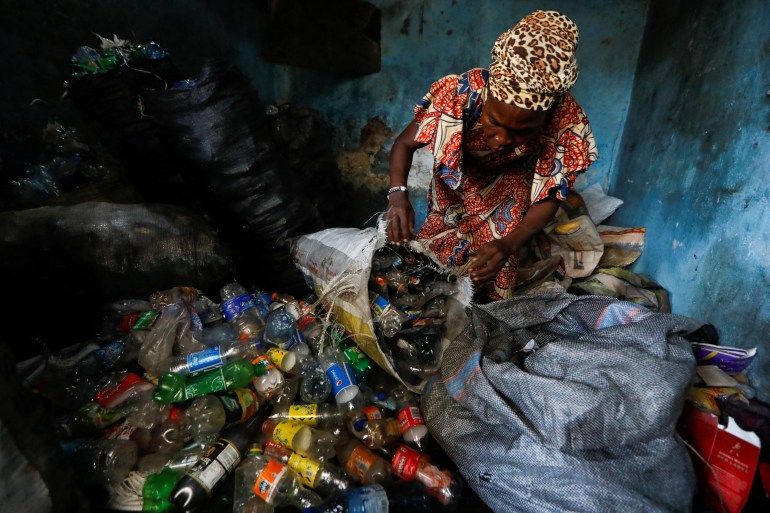Lagos, Nigeria – Mujanatu Musa’s one-roomed apartment – built mainly of rusty iron sheets – cuts a sorry sight in Ajegunle, a sprawling slum in Nigeria’s economic hub of Lagos.
Flanked by old, decrepit buildings, the makeshift structure shelters the 40-year-old mother and her three children, Abdulrahman, 12, and 9-year-old twins, Abdulwaris and Abdulmalik.
Since Musa and her husband separated more than three years ago, the family has been living on her irregular earnings of about 2,000 naira ($1.30) a day from hairdressing work. In dry spells when there are no customers, she is forced to borrow money from neighbours, she said.
Times are tough for the family, who fit into the fold of the 133 million, or 63 percent, of Nigeria’s population living in multidimensional poverty, according to government data.
If not for the privately run school in the community that charges low tuition and allows underprivileged parents to pay school fees with used plastic bottles, the children would have no access to formal education, Musa said.
“Their father has left us since 2020. The plastic is what helps me pay their tuition,” the mother told Al Jazeera.
“I couldn’t afford to send them to school. My children and I are always picking up used plastic bottles around us.
“They know their education depends on it, and we even go to event venues to pick.”
Plastic for tuition
In Ajegunle and other parts of Lagos, privately run and government schools co-exist, but parents prefer the former because most public schools are overstretched, which negatively affects the quality of education the children get.
While all government schools in Lagos are “free”, school managements charge roughly 5,000 naira (about $3) per student per term to cover some overhead costs.
The school the Musas attend, Morit International School, is located about 1km from their residence.
It was first established as a fee-paying school in 2010 by Patrick Mbamarah, a chemistry graduate. Tuition was initially 6,000 naira ($3.66) per term, but most parents and guardians in the area could not afford it.
After outstanding fees piled up and the losses started affecting the school, it was forced to shut down in 2012.

Mbamarah was able to resume operations in 2014, yet it was on the verge of being crippled by debt yet again when he came up with a “plastic-for-tuition” initiative.
“I was walking down the street one day when the sight of plastic bottles scattered everywhere struck me,” he told Al Jazeera. “This is money,” Mbamarah thought to himself.
He decided that for those who could not afford to pay tuition in naira, he’d allow them to pay in used polyethylene terephthalate (PET) bottles and sachet water waste, which the school would collect and then send out for recycling – earning them some money.
“I introduced it to the parents as an alternative means of paying their children’s school fees while also keeping the environment clean. They embraced the idea wholeheartedly,” Mbamarah said.
Growing up in Ajegunle, a heavily populated low-income neighbourhood, Mbamarah lost his way on the streets as a young person. He was hooked on drugs and indulged in other vices, which, he said, almost wrecked him before education helped give him a second chance at a decent life.
Buoyed by the resolve to prevent underprivileged children from suffering similar challenges he faced as a young person, he established the primary school. He later founded a secondary school in the community, working tirelessly to get both institutions running.
“We currently have 158 students: 112 in the primary school, including my 3 kids, and 46 in the secondary school. The tuition is now 10,000 naira (about $6) for primary school and 21,000 naira ($13) for secondary school per term. I don’t want to charge much in order not to scare the parents away,” he said.
“A kilogram of plastic bottles consists of 21 units sold for 100 naira. This means the tuition for a pupil is equivalent to 100kg,” he explained, saying parents who choose to pay in plastic always meet their quota.
Fears the school could close
When Morit International first started, there were five pupils, including one of Mbamarah’s children. In the years since, enrolments have increased and, with it, the volume of plastic bottles at the school has swelled.
While ordinarily this would be a blessing, the payment scheme has created logistical issues that have proven a bigger challenge – and cost – than Mbamarah anticipated.
Every week, parents bring in the plastic payment, but there is no storage facility on site to keep tonnes of bottles for days, Mbamarah explained.
Hiring a pick-up van to regularly carry them to recycling points for sale comes at a huge cost that considerably drains the school’s proceeds.
A few recyclers who provide such service for free or at a little cost only come for pick-up occasionally, he added.

The logistics crisis is now affecting school operations. It has limited the “plastic-for-tuition” initiative to only the primary school, putting the whole project on the cusp of extinction.
Mbamarah has also had to cut back on the collection of plastic bottles because they end up littering the school premises, causing environmental problems the initiative seeks to solve in the first place.
“Plastic waste in Ajegunle is huge, but we currently collect way below what we should. We collect about 500kg every two weeks, whereas we can actually get at least 2 tonnes [2,000 kg] per week,” he said.
“Parents bring enough plastic bottles, but most times they take them back home because we don’t have space to keep them. I work with two recycling companies, but they hardly come on time to pick. So both the school and the parents often have excess plastic bottles.”
With the challenges and costs, the proprietor said he’s also defaulting on the repayment of loans he took from two banks to pay rent and staff salaries.
He had borrowed 300,000 naira ($183) to renew the primary school’s yearly rent in December 2023, while that of the secondary school gulps 800,000 naira ($488) annually.
“A time will come when I won’t be able to pay the rent again, and they [the property owners] will just ask us to leave the school premises. I fear that in a very short time I won’t be able to run the [primary] school again. I have been doing everything to cut costs,” he said.
Mbamarah said though the primary school needs at least 11 teachers, “we only have five teachers, including my wife and I”. The secondary school has seven teachers, when it needs a minimum of 12.
“I teach in both primary and secondary schools. A teacher teaches more than two subjects, and I am still considering downsizing so I can pay the staff. The distance between the two schools is about an 18-minute walk. I shuttle both three times a day. For how long can I do that? I will just break down one day,” he lamented.
‘It is getting worse’
Rhoda Adebayo, one of the schoolteachers, equally fears the situation could get out of hand sooner than expected. When she joined the primary school two years ago, she was teaching seven subjects.
“Now I teach 13 [subjects]. It is stressful, but the passion keeps me going. Like Mr Patrick, I also grew up in Ajegunle. I know what many children go through. My salary is very poor, but I find the [plastic-for-tuition] initiative laudable and decided to assist the children.
“The school population keeps growing. We have been managing the situation. Sadly, it is getting worse. The paucity of funds is really telling on the school operations,” she said.

A couple of non-profits have promised to assist the school, but none have yet redeemed their promises, Mbamarah said. Some Lagos state government officials also visited the school last year and promised to forge a partnership, though nothing has happened since. However, some individuals do support the school through donations, he added.
The school deserves every bit of support from individuals and corporate bodies to stay afloat and thrive, said Debo Adeniyi, the CEO and chief sustainability lead at a nonprofit think tank, the Centre for Global Solutions and Sustainable Development.
“The initiative is highly commendable, and it helps the environment a lot. The amount of plastic that goes into the environment, especially water bodies, will reduce, and invariably, the environmental impact will reduce,” he said.
In the meantime, Adeniyi advised the school to look for more recyclers to mitigate the difficulty of storing plastic bottles.
“Imagine if one million plastic bottles got off the drainage system. More importantly, the initiative is addressing the out-of-school children menace, which has become a serious challenge in Nigeria,” he added.
For Musa and many parents who could not afford their children’s tuition in cash, a looming shutdown of the school would spell doom.
Without Morit, the pupils may add to the alarming number of out-of-school children aged 5–14 in Nigeria, estimated at 10.5 million, according to UNICEF.
“I am worried,” Musa declared, looking downcast.
“See my room,” she said, gesturing inside her small apartment. “I don’t have any appliances there. No television, no fan, nothing. The consolation is that my children are in school.
“Abdulrahman is in Primary 4, and his siblings, the twins, are in Primary 2. Where will I find money to send them to another school if this one shuts down?”









More Stories
Reds fire manager after 6 seasons
UPS hiring thousands in Colorado for holiday season
How a four-day workweek could ease employee burnout